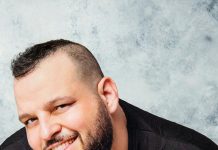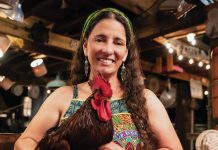
Photo by Mark Clennon.
Musician Kev Marcus has always sought to break stereotypes.
Growing up in Fort Lauderdale, he gravitated toward the violin and found a musical compatriot in violist Wil Baptiste. Together, they merged their classical training and hip-hop influences to form Black Violin. They’ve since released three albums, including 2019’s Take the Stairs, and are committed to sharing their genre-defying sound with audiences across the country. FLI recently caught up with Marcus to discuss influences and more.
FLI: When did you realize you could do this for a living?
Marcus: When we won Showtime at the Apollo. It is the hardest crowd in the world—they boo you off the stage if they don’t like you. The first four contestants who were on the talent show with us got booed off the stage. We were staring at our [instruments] and were like man, I don’t know. Then we went out there and won three shows straight and became 2005 Apollo legends. That was when we looked at each other, pulled out our phones, called our jobs, and quit. It was still a hard climb from there, but that was the aha moment because they didn’t boo us off the stage and we earned their respect, so we felt like we could play anywhere.
Who are your favorite classical composers?
I love late Romantics, so Beethoven would be on my list. I love Chevalier, wow. Bach is the OG. … We have a lot of Dvorák on this new album. We have a song called “Serenade,” which is Dvorák’s “Serenade for Strings,” but we put a beat to it. We made it breathe and have a heartbeat as if a conductor is conducting it. It sounds like it can live on a classical station even though there’s a trap, hip-hop beat underneath it.
What about a favorite hip-hop artist or producer?
Timbaland is why we became producers. He had a very strong influence on us and how our music has grown too. Pharrell is groundbreaking and does amazing stuff as well. Billie Eilish’s brother [Finneas O’Connell], phew, he’s killing it. I love how he produced her project where less is more. And less is always more, and the really good producers know how to execute that really well. I love artists who put a message to the music. I think truly gifted artists can move you in multiple ways, not just make you shake your butt. They can inspire you or take you to a whole other mood or vibe you didn’t even know you had. And that’s what true art is. True art can give you an emotion that you didn’t know you had.
Talk to me about your latest album, Take the Stairs. What was your overall goal with it and what themes and messages were you hoping to tease out?
The whole album is about hope. When we were sitting down and coming up with the meat and potatoes and the music behind the album, everything was centered around hope. We wanted it to be realistic though, not just roses, but really real and really hopeful. We wanted it to be a reference, something that you go back to every now and then to feel this energy that we’re trying to get across. To replenish this hopefulness, you’ve just got to pop it in and be like, oh yeah, this makes me feel good, this makes me feel like I can do anything. That’s really what we’re trying to get across, without it being preachy or anything like that. … Like Stevie Wonder’s Songs in the Key of Life. That to me is an album I go back to every now and then, and it just fills me with something that I can’t describe, but I need it. And that’s what we were going for.
During your tours, you often perform for low-income students. Why is this so important to you and Wil, and what are you hoping the kids get from the experience?
We think of, what if we had seen ourselves when we were in the fifth grade? I know from the outside looking in, it seems like we’re just giving these kids a show and then telling them about the violin. But the entire point of Black Violin is to say look at this thing we just picked up in high school. Look at what we did with it, and now we control our own destiny. The thing that I’m most proud of isn’t that we figured out how to put hip-hop and violin together; it’s that we figured out people liked it when we did that.
Kids are a big part of the mission of what we do. In our effort to connect the dots, we just started our own foundation, the Black Violin Foundation. The first leg that we’re starting right now is a program trying to get kids grants. Me growing up, I didn’t have any money, but my teachers saw the talent in me and ended up helping to get me a violin. That violin helped to get me to another level, and those little things matter.










Facebook Comments